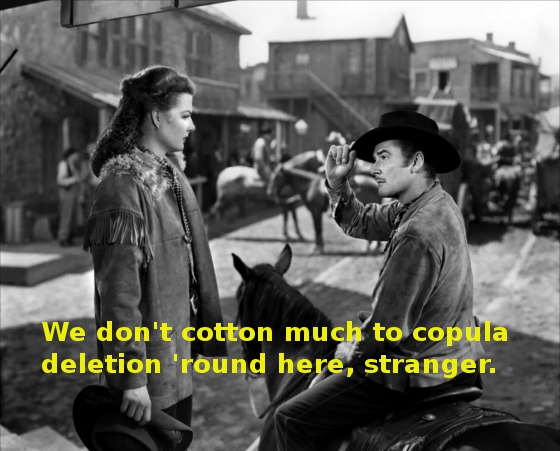 My occasional posts about language have sometimes caused a little brush with what has been hyped as a “language war” between “descriptivists” and “prescriptivists”. I don’t think it’s a real war myself, but more an excuse to write, for people with too little to write about. People who like to write can get hung up on this sort of thing. It’s one of those hazards of human behavior; to apply one’s own activity to one’s own activity. It’s why we have a surplus of:
My occasional posts about language have sometimes caused a little brush with what has been hyped as a “language war” between “descriptivists” and “prescriptivists”. I don’t think it’s a real war myself, but more an excuse to write, for people with too little to write about. People who like to write can get hung up on this sort of thing. It’s one of those hazards of human behavior; to apply one’s own activity to one’s own activity. It’s why we have a surplus of:
blogs about writing
books about literature
songs about music
movies & plays about show biz
PhDs in education
I got to this subject by writing about political activity; just trying to encourage my associates to think a little more about how to communicate effectively. To that end, another rant. But first I’ll try to cover some principles about the “descriptive” vs “prescriptive” non-war. Let’s see how fast we can get through the obvious stuff.
 (1) There is no “original” form of any language (except an artificial one, like Esperanto). There was no Englishman at the Tower of Babel who originated his language. There was no Adam or Eve speaking some “original” language. Those are fables, and not very good ones at that. If you don’t accept this, go read your fundie tracts. You won’t like my blog at all.
(1) There is no “original” form of any language (except an artificial one, like Esperanto). There was no Englishman at the Tower of Babel who originated his language. There was no Adam or Eve speaking some “original” language. Those are fables, and not very good ones at that. If you don’t accept this, go read your fundie tracts. You won’t like my blog at all.
(2) Languages in use today all evolved from earlier languages, seamlessly. There was no defining moment between Latin and Italian, or Middle English and modern English. Reading anything written 200 years ago, or even watching a film made 80 years ago, should make it fairly obvious that language is always changing.
(3) All the older languages were quite diverse. What you see in one ancient book, like the Iliad or one of the Vedas, is a snapshot of one dialect, as written by one writer or group of writers, frozen whenever people began preserving manuscripts of it. Every pattern of speech habits common to some group that has been named as a “language” has presumably taken many forms, whether examples of them survive or not.
(4) As more gets recorded in a language, and more people view what is recorded, it changes more slowly. I’m told that a modern Greek reading Homer is about comparable to me reading Chaucer. One is 2,800 years old, the other is 600 years old. Greek has had a sizeable body of literature and literate people much longer than English, hence the slower change.
(5) With sound recording, and easy access to it, language should be changing even more slowly now. With mass communication, the general trend is toward more uniformity. Much as some writers decry diversity in language, they would have had to put up with far more of it in earlier times, once they wandered 30 miles or so from their home villages.
Item #4 above is just a corollary to a general principle in anthropology that education stifles innovation. This might seem counterintuitive to someone who has swallowed propaganda from “entrepreneurs” who want us to worship their kind of “innovation” (“Let us destroy natural systems and societies to make money. It’s PROGRESS!”), and thinks of
“innovation” as something always good, always showing skill or savvy of some kind.
 It’s important to remember just how many things the word “innovation” can cover. A new way of whistling, tying a bundle, or making soup is innovation. It might be a random variation, showing no skill at all, and it’s like genetic mutation: There are millions of “failures” for every “success”.
It’s important to remember just how many things the word “innovation” can cover. A new way of whistling, tying a bundle, or making soup is innovation. It might be a random variation, showing no skill at all, and it’s like genetic mutation: There are millions of “failures” for every “success”.
Just google for a list of slang from the mid-20th century. You’ll see tons of linguistic innovations that have died quiet deaths, and a few that have survived 50 years or so. Just to make it onto a list like this, for instance: https://fiftiesweb.com/pop/1950s-slang/ , a word had to be used by a few hundred people at least.
 Most linguistic innovations die long before that; whenever a five-year-old finds out a more effective way to say something, or what the word he just used in an odd way means to other people.
Most linguistic innovations die long before that; whenever a five-year-old finds out a more effective way to say something, or what the word he just used in an odd way means to other people.
There’s where the “descriptivist” and “prescriptivist” points of view can arise. Is the five-year-old using the word WRONG, or just using it in a new way? Let’s take a trivial example.
If I call a dog a “cat” in the fifties slang sense, is that an error, or am I just recognizing him as a personality anthropomorphically? It depends on how the hearer understands it, of course. That can depend on context, perception of the speaker’s attitude, whether the hearer is aware of that bit of slang, all kinds of things. The “prescriptivist” is more likely to point out the confusion such a usage can make, and mention an old editor’s rule: “Don’t use slang.” The “descriptivist” doesn’t point to any old rules, but just records the fact that someone used that word in that way.
When the “prescriptivist” says “This is against the rules!”, the “descriptivist” says: “But there aren’t any rules in how people use language. All we can do is look for patterns in what we observe.” The two have very different purposes in mind. The “descriptivist” is a linguist who wants to understand how language works.
 The “prescriptivist” is not playing around with theories (if smart), but wants to get the job of communicating done. The “prescriptivist” is, most emphatically, NOT a linguist. It’s the difference between a climate scientist and a sailor: It’s not that a certain wind or current doesn’t exist, it’s just not very smart to ride it if that’s not where you want to go.
The “prescriptivist” is not playing around with theories (if smart), but wants to get the job of communicating done. The “prescriptivist” is, most emphatically, NOT a linguist. It’s the difference between a climate scientist and a sailor: It’s not that a certain wind or current doesn’t exist, it’s just not very smart to ride it if that’s not where you want to go.
 Between the linguist and the user of language might lie the lexicographer and grammarian, who make reference books and explanations to inform users of what seems to be common, or uncommon, practice with a language. Such books change a great deal every 50 years or so, and always have.
Between the linguist and the user of language might lie the lexicographer and grammarian, who make reference books and explanations to inform users of what seems to be common, or uncommon, practice with a language. Such books change a great deal every 50 years or so, and always have.
I love to read about what linguists study (when it’s accessible to the layman), but it doesn’t get my flyers or emails written. It doesn’t make any new converts to my political beliefs. To communicate with people, you need to use a language that is already understood by large numbers, in a way that makes the listener identify with the speaker. Avoiding distraction in what you say or write is a big part of that.
To illustrate, let’s take a couple of examples from this phony war:
.
DECIMATE
Y’all know my opinion of this from an earlier post. I know of one lexicographer who wants to allow the “completely destroy” meaning into the dictionary, based on how commonly it’s used. That is, of course, the arbiter of inclusion in a dictionary. But for the time being, as long as there are minimally educated people around, the “deci” in that word will always remind us of its primary meaning, and make dissonance whenever we hear it used otherwise. It distracts people from whatever point you’re trying to get across. What is your reason for using “decimate” rather than “destroy”, anyway? If all you mean is “destroy”, why not use the much more common, easily understood, “destroy”?
.
IRREGARDLESS
 This is one where the “prescriptivist”, or a troll playing one, might say, “It’s NOT A WORD!” That’s ridiculous, of course it’s a word. It’s a silly word, that marks the user as a silly person. A composite of “irrespective” and “regardless”, it might have originated as a joke, a deliberate malapropism. Enough people didn’t get the joke that it became common for a while, and now the user makes himself a joke. It’s part of the language, but that doesn’t mean you should use it if you want to be taken seriously.
This is one where the “prescriptivist”, or a troll playing one, might say, “It’s NOT A WORD!” That’s ridiculous, of course it’s a word. It’s a silly word, that marks the user as a silly person. A composite of “irrespective” and “regardless”, it might have originated as a joke, a deliberate malapropism. Enough people didn’t get the joke that it became common for a while, and now the user makes himself a joke. It’s part of the language, but that doesn’t mean you should use it if you want to be taken seriously.
With all that in mind, here are some additions to my list of things that might send a different message from what you want to send with your language.
**************************************************************
**************************************************************
Message #1: “I’m using weasel words to sell you something”
 The ad biz has made more innovations in language than I care to count, some of which have gone mainstream, but it’s not good to sound like a slick salesman when you’re trying to sell serious ideas. It’s really best to avoid weasel words of quantity like:
The ad biz has made more innovations in language than I care to count, some of which have gone mainstream, but it’s not good to sound like a slick salesman when you’re trying to sell serious ideas. It’s really best to avoid weasel words of quantity like:
“use up to four times less” (from a Charmin commercial)
(WTF is that supposed to mean, anyway?)
“98% fat free”
(How is this different from “2% fat”?)
“up to 70% off!” (“Up to” of course specifies only an upper limit, not a lower limit. Zero is included in that range.)
“as little as..” (likewise, specifies a lower limit, but no upper limit)
“upwards of…” (trying to give the impression that the number continues on up for some distance, when it might actually stop just the tiniest bit above the number specified)
———————————————————————–
Message #2: “I want to sound enthusiastic and supportive of something, or want to emphasize something in my speech, but I don’t have the wit to do so.”
 “So” has several uses in our language. For some people, it ends every declarative sentence. For some, “about so” accompanies a gesture indicating dimensions.
“So” has several uses in our language. For some people, it ends every declarative sentence. For some, “about so” accompanies a gesture indicating dimensions.
Probably related to the latter, it’s also used as follows:
“I am SO proud to be here with you today.” “It was SO good of you to invite me.” “This issue is SO important.”
How important is it?
The grey among us remember this as one of Johnny Carson’s stock routines:
“It was so hot today I saw a robin dipping his worm in Nestea.”
“It was so hot today that Burger King was singing, ‘if you want it your way, cook it yourself.'”
“Last night, it was so cold, the flashers in New York were only describing themselves. “
Those with less wit are unable to complete the routine. Don’t start what you can’t finish, ok?
———————————————————————-
Message #3: “I am trained in the pretentious, bullying, deceptive ways of management.
 Much has been written about management speak. Like five year-olds, business managers are a rich source of innovation in language. You can explore it here: http://unsuck-it.com/ If you want to avoid sounding like the guy who laid people off or that HR manager who thinks you go to the bathroom too often during work, you might want to take note of the general characteristics of their language use:
Much has been written about management speak. Like five year-olds, business managers are a rich source of innovation in language. You can explore it here: http://unsuck-it.com/ If you want to avoid sounding like the guy who laid people off or that HR manager who thinks you go to the bathroom too often during work, you might want to take note of the general characteristics of their language use:
(1) Nonsense, but it sounds forceful: “giving 110%”
(2) Using more words than necessary (a habit probably formed by trying to look productive): “at a rapid pace” rather than “fast”.
(3) Making a new word, or a new meaning for an old word, when completely unnecessary. This might be done for several reasons:
● Ignorance: using “impact” as a verb because management clowns could never figure out how to use “affect”.
● Attempt to appear to have esoteric knowledge: “disincentivize” for “discourage”,
● Attempt to glorify something: “proactive” and “dynamic” sprinkled randomly, “personal growth” for taking on more duties.
(4) This might not be any more common with management types than elsewhere, but beware of using “get” for “understand”. It’s often used in a bullying way. This use of “get” has been around much longer than I have, as in “get the joke”, but it seems to have exploded in recent times. Maybe it began with ESTies back in the 70s, and expanded from there. Anyone who disagrees with you or doesn’t understand your nonsense doesn’t “get” it. Such usage will not get you any friends.
 A nice essay about how people in power communicate is here: http://nancyfriedman.typepad.com/away_with_words/2012/05/speaking-truth-about-power.html
A nice essay about how people in power communicate is here: http://nancyfriedman.typepad.com/away_with_words/2012/05/speaking-truth-about-power.html
———————————————————-
Message #4: “I don’t know what I’m saying.”
● I subscribe to what is generally a very good lefty newsletter, and was very disappointed to read this in it a while back:
“Egyptian women involved in the struggle to break away from the Mubarak client state of the Empire, are now rebelling from bullies who sexually harass them in the streets. This is a welcome sign, women having suffered more as a consequence of their appearing in public to protest, finally receiving the support of many Egyptian men, with whom they’ve stood toe to toe in the democracy struggle.”
I’ll ignore, for this bit, whether “from” is the right preposition to follow “rebelling”, and the superfluous comma.
When people are “toe to toe”, they are in opposition. The writer was probably thinking of “shoulder to shoulder”, but that’s such a tired cliché that it might have been purged from the writer’s conscious vocabulary.
 ● I’ve seen more than one person use “in lieu of” when they must have been thinking “in view of” (“lieu” is the French word for “place”. Really, really not the same thing.)
● I’ve seen more than one person use “in lieu of” when they must have been thinking “in view of” (“lieu” is the French word for “place”. Really, really not the same thing.)
.
● “…much less…” in a place that really calls for “…not to mention…”: .
“To change our Country, much less the World, we must first change ourselves.”
.
.
● “At any rate..”
Yes, it’s a very well-established practice to use “at any rate” for “anyway”, “at least”, or “in any case”. That doesn’t mean it’s right. A “rate” is a speed, price, or some quantity linked to another quantity. If that’s not what you’re talking about, it’s not the word to use if you want to avoid dissonance. The following example, stolen from somewhere, is one that I would call “wrong” though the whole world might be against me: “You live and learn. At any rate, you live.”
● “disingenuous” for “lying” (and generally overusing the word)
Look it up. It’s not exactly the same, but some people think the two are interchangeable. A “polite” way of calling someone a liar, as if you come from a culture where too much candor would be cause for a duel. There’s enough lying that needs to be called out nowadays that you may as well clean up your chosen weapons and keep them handy. I keep a pair of banana cream pies in a nice mahogany case just for that.
***************************************************
***************************************************
None of this, of course, should be cause to suppress any creative impulses you might have in your language. Euphemisms and malapropisms are harmless ways of joking around, if they’re original, but repeating the same old figures of speech, especially malapropisms, gets old.
Much-circulated quote, probably not from Descartes, but often attributed to him:
“Any community that gets its laughs by pretending to be idiots will eventually be flooded by actual idiots who mistakenly believe that they’re in good company.”
Happy bantering, all.
https://youtu.be/WNpX9fs41_s






I had to, really – it was all just too much… hope I haven’t affected your writing in this posting…
On the bullet point:
“● Ignorance: using “impact” as a verb because management clowns could never figure out how to use “affect”.”
My contribution to the library of orphaned letters, a response with a slight adjustment to the above point;
Affect and Effect are two similar words that I have kept at bay for a long time, as they threaten to annihilate each other in a matter-antimatter climactic episode where one of them finally triumphs to crown an obscure University’s Literature Department PhD candidate’s Thesis in English Synonyms. Herein I offer critical evidence of yet continued incorrect usage of the two words that fight eternally for their separate identity: from Wikipedia;
“usage: Affect and effect are both verbs and nouns, but only effect is common as a noun, usually meaning ‘a result, consequence, impression, etc.’: my father’s warnings had no effect on my adventurousness. The noun affect is restricted almost entirely to psychology (see affect3). As verbs, they are used differently. Affect most commonly means ‘produce an effect on, influence’: smoking during pregnancy can affect the baby’s development. Affect also means ‘pretend to have or feel (something)’ (see affect2): she affected a concern for those who had lost their jobs. Effect means ‘bring about’: the negotiators effected an agreement despite many difficulties.”
My use of the word “affect” is to point out an effect on a person’s emotional state. The use of effect as I have used it is to point out a cause and effect situation of “A contacts B and effects the change in energy of C”, like a game of billiards.
I hate to say it, really, but reference to the misuse of one word and scapegoating others while employing a barely perceptible yet incorrect English on the cue ball has landed the comment too early in the pocket, like the proverbial 8 ball.
Cheers to you Mudge, for the continued blog that everyone likes to read like we used to read Ralph Story in the legendary Los Angeles Times of old. Frank Zappa is proud of this small corollary to his insightful Cum Laude statement at the graduation ceremony of his kindergarten class depicted in the fifth photo frame.
“If civilization were set-fast to the extent of encompassing an entire planet, and nature were eliminated to the great extent, would not civilization then be the new wilderness to conquer?”
…by Ron – (this was the profound thought that was passing through my head as my toe hit a rock, sending me sprawling on the trail; initiating a corollary insight that all men are fools in real time, regardless…
Aigo! – Jeeze! -the fish are bitin’ – I caught another;
● “At any rate..”
Yes, it’s a very well-established practice to use “at any rate” for “anyway”, “at least”, or “in any case”. That doesn’t mean it’s right. A “rate” is a speed, price, or some quantity linked to another quantity. If that’s not what you’re talking about, it’s not the word to use if you want to avoid dissonance. The following example, stolen from somewhere, is one that I would call “wrong” though the whole world might be against me: “You live and learn. At any rate, you live.”
I disagree with this observation; the thesaurus that was employed has not been recently updated. The use of the word “rate” in the above comment Re: “at any rate” is not the same word railed against.
In the context of the phrase “at any rate”, the “rate” is referring to a judgement or rating which no matter what the appraised value, it does not have value enough to convince the other of its worth.
So, when one says “You live and learn, at any rate, you live” one refers to the recently in-vouge perception of a college education vs. the University of Black and Blue, where the perception of late is that even with a horrendously expensive education and degree, or equally expensive street experience to survive, the bottom line is that one survives, no matter what the “rate” of the scholastic regimen practiced.
(Definition – “Aigo” – Korean phrase used similarly as Oh my God!, as an exclamation of surprise. Compare “OMG” to “Aigo” and one finds agreement in Korea.)
I greatly enjoyed your latest blog entry. Your postings since the election have been so scarce that I was afraid that you had tired of posting. Greatly relieved to see you are back at it again. Love, Mom P.S. There is only one l in Iliad.
Thanks. Fixed. Believe it or not, I had someone proof this. Composing in Arial can make all those cap Is and lower case ls a blurr.
I was having a whale of a time telescoping from blog to blog, what with a lexicographer’s post and then yours (thanks, WordPress!), but your mother’s PSing you just made my day. Terrific.
Great article btw 😉
Your post made me think. I do use a lot of “so” (like in “It is so beautiful!”) in my own language. Does it mean “I want to be enthusiastic and supportive of something, or want to emphasize something in my speech, but I don’t have the wit to do so”? I’ll have to watch myself next time I use “so” and find out what I really want. 🙂
Good to hear from you, Olga. I shouldn’t try to speculate about what sounds ok in another language. If I remember it right, the construction in Russian would be “так (adjective), что (clause)”. Leaving off the что clause might be perfectly ok among Russians, but using “so” as a substitute for “very” is a widespread bad habit among Americans.
We have about the same construction as the one you’re describing here in Russian. Instead of saying “It’s very beautiful” I can say “It’s so beautiful!” (“so” being translated into Russian as “так” and more often as “как”: “Как красиво!”) I suppose it does imply something of what you state.
Yes, I’d forgotten about that use of “как”. “Как красиво!” would be “How pretty!” in English more often than “So pretty!”. That’s not to say that someone, somewhere, wouldn’t say “So pretty!”. No accounting for random variations. What you will find is something like: “It’s SOOOOO pretty!”, just using the dragged out “so” as an emphatic “very”. Kinda grates on my ears.
but understand that there is a difference between language evolving slowly over time (like ye to you, and so forth) and language being simply misused. More and more today, people abuse language because doing so allows them to score cheap rhetorical and political points.Wouldn’t you agree, commie?
Thanks for the nice example of misuse for cheap rhetorical points, with the “commie”.
The shift from “ye” to “you” was undoubtably thought of by someone as a “misuse” when it began, and the same applies to most changes in a language. Whether something new is good or bad is a judgment call in which I apply two questions (as I stated in a previous post: https://kitchenmudge.wordpress.com/2012/03/08/the-grey-speaker-strikes-again/):
(1) Does it get the meaning across?
(2) Does it do so with the least effort?
A sensible and humorous tour. Thank you! It seems to me that we should all be middle-of-the-roaders in this argument. The prescriptivists are trying to preserve clear, concise meaning, not just ‘correct’ (which = ‘old’) definitions. As you mentioned in ‘decimate’, the newly common use (as in annihilate) is confusing to much of the public. How much, I don’t know. On the other hand, there’s no doubt language is in constant flux.
As a matter of fact (oh,yes: knock knock, may I?), I too wondered at “decimate” as I read the article, and your comment brought me back to it: I humbly referred to a few online dictionary definitions, just to find the “popular” meanings listed atop -or even as the only one! Incidentally, this also sent me to the major authoritative source in my own language (namely Diccionario de la Lengua, Real Academia Española) (though I am not Spanish but Hispanic) and I was shocked to get much the same; the moral of the story perhaps being the non-war featured above.
Cheers
A quick Googling tells me that the definition listed first is usually something like “destroy a large part of”. In any case, I proposed the simplest solution long ago: Avoid the word altogether. There are plenty of other words for the same thing.
Thanks for your comments, avadapalabra. I’m always a little surprised that anyone is reading.
Cory Stamper and Emily Brewster, associate editors of Merriam Webster, condone the misusage of words by identifying the misusage as a variant. Regardless of the misusage, whether it is grammatical, orthographical, or orthoepical, they justify the misusage as a variant.
An example of their descriptive approach to language is how they purport the variant pronunciation of “mischievous”,(MIs-chi-vus). (Three syllables stress on the first.) Their claim that some educated speakers pronounce it mis-CHEE-vee-us, as if it were spelled “mischievious”, is specious. The accent would be on the wrong syllable and there would be an added erroneous syllable to the word. Who are these educated speakers and how educated are they? Furthermore, how does one distinguish an educated speaker from a non-educated speaker, since according to the editors of MW, the majority of language rules should not be necessarily adhered to. Ostensibly we distinguish educated speakers by their vocabulary and grammar, as Ms.Brewster and Ms.Stamper make that distinction they counter their position concerning misusage. After all, they cannot have it both ways; if there is a variant to every mispronounced, misspelled and misdefined word then why bother with right or wrong; two words that don’t exist in their vocabulary.
A malapropism is the misuse of a word, but if we approve of Ms.Stamper and Ms.Brewster’s position then a malapropism cannot exist and all misused words are just variants.
I must presume that the associate editors of MW do not mispronounce “mischievous”; because they understand what is the correct and logical usage of the word. What is disappointing and irritating, however, is how linguists and lexicographers countenance misusage, which essentially promotes it, but they themselves never practice what they preach; they know better.
Ingenious.
Above is a really nice parody of what a badly misguided “prescriptivist” might say. Its premise is a fundamental misunderstanding of both linguistics and lexicography. The job of those specialties is to describe what is, not make value judgments about it. They don’t condone anything, they only report it. (Expecting any word in English to be pronounced in agreement with its spelling is especially humorous.)
All users of language, on the other hand, make value judgments all the time in what they decide to use for their own purposes. We are all “prescriptivists” for ourselves.
There followed here a long thread in which “William” revealed himself as a pitiful creature with way too much time on his hands. It was beginning to suck in casual visitors who didn’t understand the situation. As a last resort, I ended up banning “William” and four sock puppets he was using. It’s not displayed, but I have it archived if anyone (yeah, right) wants to see it.
As a matter of fact, I meant to write to you yesterday and ask whether it would not be wiser to erase certain overly aggressive comments (even one or two of mine as I got carried away by some people’s personal attacks -really sorry about that! [you see, Weewee went as far as to insult me on MY own blog, in an extremely saddistic and disrespectful way…). Glad you took the issue into your own hands.
No problem. I knew that if “William” kept on long enough, he would hang himself eventually. That’s the only way I know to handle a troll: Don’t try to argue logically, just make him rage as he hopes to make you rage.
Pingback: PANIC TIME! | kitchenmudge